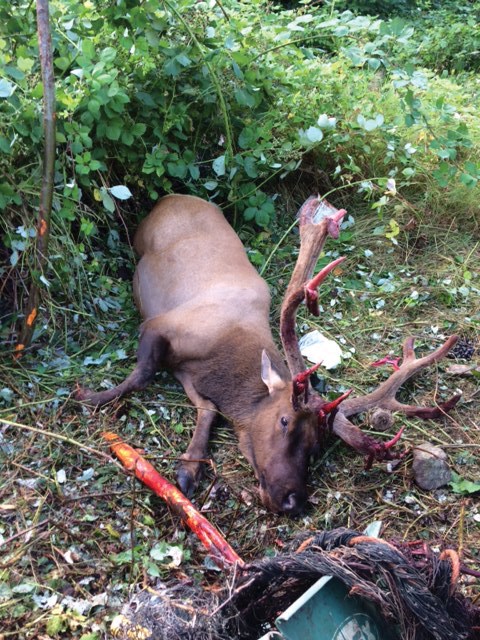Sunshine Coast conservation officers are urging property owners to keep their yards free of fishing nets after they were forced to chemically immobilize an entangled bull elk on July 26 in Egmont.
The elk, which weighed close to 1,000 pounds and had a set of 5x5 point antlers, had become so wrapped up in the fishing net that he could not free his head, conservation officer Nicole Caithness said.
“In order to prevent further stress on the exhausted animal and to ensure human safety, the decision was made to chemically immobilize the elk prior to approaching him to cut the netting off,” Caithness said. “The bull was immobilized using veterinary supplied drugs, and the netting was cut off and removed from the area. Reversal drugs were then administered and the elk was monitored until he regained movement and went charging off into the bush, where it is expected that he will make a full recovery.”
Caithness said chemical immobilization is hard on ungulates such as elk and moose, especially in the hot summer months, and can often result in the death of the immobilized animal even when correctly administered.
“Ungulates are prone to overheating, suffocation due to large body mass and choking on their ruminant stomach contents when immobilized, and immobilization is only undertaken as a last resort in these types of situations.”
Fishing nets and similar materials can easily become entangled around wildlife and cause considerable stress or even death to the affected animal, she said.
“If netting is required in order to keep wildlife out of gardens, the Conservation Officer Service encourages residents to use page wire, which will break and give under enough stress as opposed to durable netting such as fishing net, which will only become stronger as it gets wound around a struggling animal. Electric fencing is also a very good option for deterring wildlife, whether it is trying to keep deer out of gardens or bears out of garbage, as it is effective and relatively inexpensive to buy and install.”
The bull elk is a member of the recovering coastal Roosevelt elk population and Caithness noted the population’s survival depends on such animals breeding successfully each year. “There is tremendous ecological, economic and intrinsic value placed on breeding males, so the needless loss of an individual animal such as a big healthy bull can have negative impacts on the health of the entire elk population,” she said.
If a deer, elk or other large or dangerous animal does become trapped on your property, call the Report All Poachers and Polluters line (R.A.P.P. line) at 1-877-952-7277 and conservation officers will be able to assist in freeing the animal in a humane and timely fashion.
– Coast Reporter



